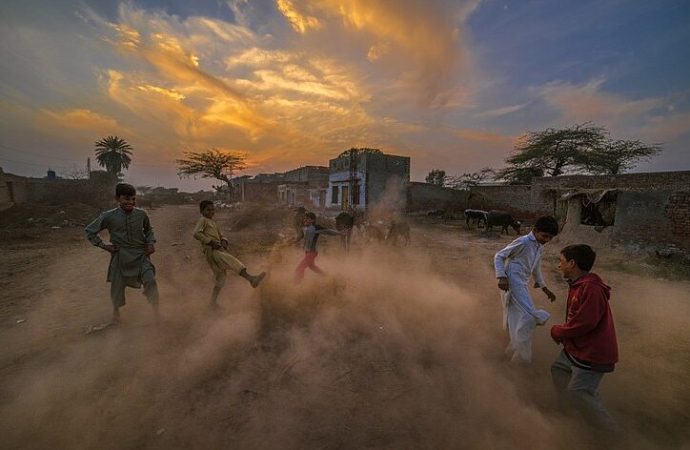Author Recent Posts Faiza Eiman Malik Latest posts by Faiza Eiman Malik (see all) Illegal Afghan Refugees and the Security Threat to Pakistan – September 19, 2025 Pakistan’s Disaster Preparedness and Deferred Resilience – September 10, 2025 Pakistan-US Oil Deal Redefines Diplomatic Relations – September 3, 2025
Climate crisis is feeding Pakistan’s hunger, while we argue over borders. Our once fertile lands are now drowned. The unpredictable weather patterns, record breaking temperatures and flash flooding pose serious threats to our country and food insecurity is one of these. The current climate crisis is not only reducing agricultural productivity but also livestock and water availability. We may talk about impact of climate crisis, but a question still rests in our minds that Why will Pakistan fail to feed its people despite knowing its soil, seasons and systems will collapse soon?
The climate crisis is no longer a phenomenon to be found in textbooks only. It has not only become a harsh reality but the most ignored one. As of 2025, our environmental condition is clear that it has reached our farms and ultimately our dining tables. That simply means climate crisis is leading to food insecurity in Pakistan. Food security means when all people have economic and physical reach to food with availability of basic nutritional values. One would wonder that the term food insecurity was discovered first or the opposite in Pakistan. Unfortunately, Pakistan was already lagging in terms of that, but the climate crisis has only accelerated this process that might lead to only elite survival by next few years. The proof of that is paddy fields destruction in Sindh last year. Also, the wheat yield in southern Punjab has significantly reduced due to heatwaves.
The climate crisis is not only causing destruction of crops, but it is also impacting farmers. More than half of Pakistanis rely on agriculture, so its vulnerability will not only make consumers subject to food insecurity but also the producers. Pakistan’s one of the staple crops, wheat, is highly sensitive to temperature. Rice and sugarcane require high abundant water. The temperature shifts and erratic rainfall have left farmers with a guessing game that whether it’s going to rain late or early or will there be only extreme heatwaves. The livelihoods of smallholder farmers, which constitute the majority, are now dependent on these unpredictable seasons. They have no choice but to gamble their lifeline assets every season.
Climate crisis is an issue multiplier, with giving rise to many problems, it creates a chain of these issues, each linked with the previous one. Food insecurity rises when food access for people becomes beyond their struggle. The lack of food access rises with an increase in inflation rate. That’s what the climate crisis has done to our state. Pakistan is already falling below poverty line. People are struggling economically to make ends meet. This is not limited to economics. Inflation can lead to malnutrition and slow growth in children. It can have a long-lasting impact on our people’s health and sustenance. Food insecurity does not only exist in rural areas, but it is also spreading across the kitchens of middle class in urban areas. We don’t know where it is going to end.
Our environmental challenges demand adaptation, which can only be done by innovations. Pakistan is heavily resilient on climate vulnerable crops like wheat, rice etc. It is trying to adapt by using conventional methods like sowing date fluctuations or by introducing a new variety. This is definitely not enough. Given the circumstances and rapid decrease in agricultural yield signifies the need for changes. Our water courses lose almost 50 % of water due to seepage. Farmers do not even have enough support to shift towards smart-climate agriculture. Even if the institutes are working on non-conventional methods, the work being done is not equal to the losses already caused and the ones we are for sure going to suffer in future. Also, the projects are very low funded, making it difficult for researchers to reach the final stage of the process. Another worrying aspect is disconnection between the climate policy of Pakistan and agricultural planning. It’s not the time to work in silos, but unfortunately, we are still operating in the past.
We need to take steps to deal with current climate crisis. We can’t just romanticize the concept of climate resilience but what we really need is to bring reforms. Food insecurity is not a trivial matter to be left at the mercy of climate. Pakistan needs to create cross-sectoral policies promoting investment in water conservation especially when expecting torrential rainfall, ensuring early warning systems and climate-smart agriculture shifting the focus towards non-conventional and speedy projects. What we really need to see is what’s upcoming in the future. It’s not only hunger but a complete collapse of a nation. Pakistan needs to recognize food security as a matter of national security. This is because once hunger arrives, no diplomacy, no defence, no election will matter. We are heading towards the death of a nation where the graves will only bloom the flowers of hunger and grow trees of thirst.
- Illegal Afghan Refugees and the Security Threat to Pakistan - September 19, 2025
- Pakistan’s Disaster Preparedness and Deferred Resilience - September 10, 2025
- Pakistan-US Oil Deal Redefines Diplomatic Relations - September 3, 2025





















Leave a Comment
Your email address will not be published. Required fields are marked with *